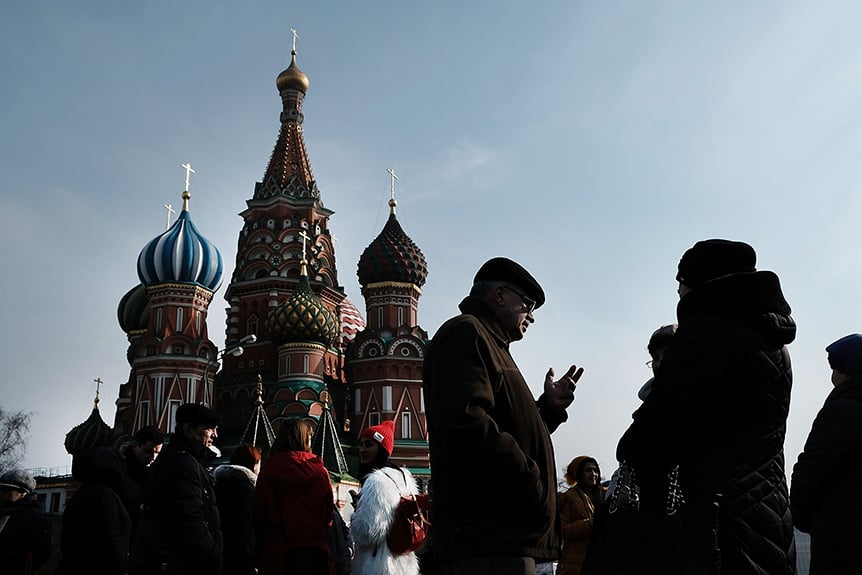Russia’s coming attack on Canada
The smear job on Chrystia Freeland is only the start. Why Canada is a logical next target in Moscow’s desperate clandestine war
People walk through Red Square in Moscow on March 7, 2017 in Moscow, Russia. (Spencer Platt/Getty Images)
Share
Moscow has been waging an increasingly daring clandestine war against western democracies. Under the direction of President Vladmir Putin, Russia is targeting most of the major members of the western alliance. In Germany, Chancellor Angela Merkel has warned of Russian attempts at cyber attacks. In France, Moscow has funded right-wing populist Marine Le Pen and is alleged to be spreading false propaganda about her opponents. There are now reports from British parliamentarians that Russia may have meddled with the Brexit campaign. And, of course, Putin’s interference in the U.S. Presidential election has lit a tire fire in Washington that may bring down the Trump administration, and at the very least has left America’s political institutions reeling, and its alliances weakened.
Moscow is being forced to play these aggressive and risky games out of desperation. The country is in bad shape and it is getting worse. The once great superpower now has an economy smaller than Canada’s and it continues to shrink. Even though they spend 5 per cent of their GDP on defence, Russia’s military forces have grown so rusted out they can barely get their last aircraft carrier to the Mediterranean and back without breaking down. Even the ragtag Ukrainians have fought them to a standstill. Diplomatically, Moscow has never been so isolated and powerless. You can count its friends on one hand, and it’s not an impressive list: Syria, Iran, Belarus.
In a rules-based international system where your influence is measured by the size of your economy, your cultural soft-power, and your stature in multilateralism, Moscow has become an afterthought. And, if Russia didn’t still have a cold war nuclear arsenal, it would garner even less attention. So, losing the international game of chess, Putin is seeking to knock over the board itself—to discredit the multilateral world order, and destabilize the comparably strong western alliance.
Canada is a logical target. We are a G7 member, a strong supporter of NATO (if not a strong contributor), an advocate for a values-based international system, and a vocal critic of Moscow and its interference in other countries. We have to expect Russia will focus more of its clandestine efforts on us, especially as we approach the next election cycle.
LONGREAD: Does Putin mark the return of the czar?
Like elsewhere, Russia has three objectives as it goes after Canada. The first is to undermine any policies or politicians seen to be against Moscow’s interests. For example, the Russian Embassy has already been trying to discredit Canada’s Foreign Minister Chrystia Freeland, an outspoken advocate for continued sanctions, with a smear job about her grandparents. Russia also wants to discredit the broader political system, to undermine Canadians’ faith in “the system”, be it our own election process, our system of government, or parliamentary affairs. Finally, it wants to undermine Canada’s support for our allies, and for the international system including NATO and the United Nations.

To achieve these goals, Moscow will likely rely on the same methods it has used relatively successfully in the United States and elsewhere. It will spread disinformation—false stories that create confusion around a controversial and heated issue. For example, during the American election, Russia used bogus social media accounts to spread rumors about Hillary Clinton. We will see similar attacks here, likely directed at the ruling Liberal party. Moscow won’t necessarily prefer a Conservative victory; the Russians will simply want to delegitimize the entire process.
Russia will also continue to hack into the computers of the government and politicians, and even into journalists’ phones, looking for embarrassing details that could be used to hurt a candidate (like John Podesta’s emails were used against Clinton), or as blackmail. And the list of targeted groups may be even longer. There are reports this week that several liberal groups in the U.S. are being extorted by Russian-backed hackers, threatening to leak emails.
Money is another useful tool in the campaign. Across Europe, Moscow has secretly and in some cases openly funded radical populist politicians (like Le Pen) and groups who are fomenting anti-immigrant hysteria. In Canada, there are not many organizations that fit that description. Nonetheless, it would not be surprising if funds found their way to some of the fringe media sites who specialize in Breitbart-style info-tainment.
More alarmingly, Canada can also expect old-fashioned military feints. In Europe, Moscow has increased the number of bomber flights that skirt along and cross into NATO territory. In the Black Sea, fighter jets have been dangerously “buzzing” American naval ships. In Canada, this tactic would take on added significance as we have all but abandoned our northern marches—we have no port in the Arctic, no four-season icebreakers, and almost no military presence. In fact, the Russians would have an easier time reaching some parts of Canada’s northern territory than we would.
It is hard to imagine any of these tactics would actually disrupt our election or cause anything but irritation for Canadians. Our politics are not as tightly wound as in other countries. As a promising sign, the Conservative party refused to play along with Russia’s smear job on Freeland (although some newspapers did). We also have fewer nativist demagogues waiting in the wings, and we have been forewarned by what is unraveling elsewhere. But, would anyone have ever predicted the political chaos in the United States? It is impossible to say if Moscow will be as successful here, but we do know the Russians are already trying, and if they do find the right wedge or the wrong secret, they will use it.